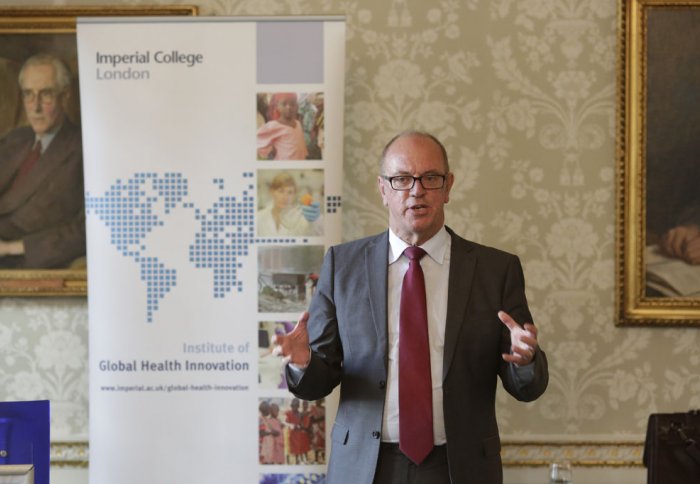IGHI Policy Seminar: Sir David Nicholson discusses the NHS post-election
by Jo Seed

Ex NHS CEO hosts Policy Seminar for IGHI.
Health VIPs were pleased to welcome ex NHS CEO, Sir David Nicholson last week for the Institute of Global Health Innovation’s (IGHI) annual Policy Seminar.
Sir David was Chief Executive of NHS England from 2006, retiring from his position earlier this year. He was in post during the NHS Reforms back in 2012 and so has a vast amount of experience in dealing with and adapting to major changes within the NHS. He explained that next May’s general election will bring with it a new set of short and long term challenges which will need addressing, particularly in relation to the lack of financial resources, quality improvement and access to care.
He said that it was hard to say what vision for the NHS's future any of the parties had, but in any case, the short term issues would become all consuming. "Whether or not the NHS gets more money or not, it is going to spend it and it won't become obvious until September of the first year of the new parliament. How the government then responds to the overspending will have a big impact on how it controls spending or what mechanisms it uses”.
Then in the medium term, there is going to be pressure to increase pay, which has been held down. In other European countries, governments have responded to the squeeze on their health services either by cutting pay or "reducing the offer" - ie curbing services available under the NHS or equivalent. But in the UK we have done neither. So the pressure to put more resources in is going to grow.
He said he was "pragmatic about the private sector, adding "The NHS doesn't have the answer to everything - we have made a mess of some services, the private sector does some very good work in niche areas". He said the 5-6 per cent of NHS work currently provided by the private sector could be expanded significantly and still not represent a large proportion of NHS spending.
He explained that from the implementation of the NHS in 1948 all the way through to 2008, the NHS had a 4.5% real-term growth rate on their expenditure. But in 2008, all that started to change and now resources are lacking and there isn’t enough money in the pot to go around.
But he was against the introduction of NHS charges, for example, to see a GP. He cited the turnaround in the position of the World Bank, which had backed user charges in health systems across the world on the basis that patients did not value something unless they paid for it. Now the World Bank takes the opposite view and advocates phasing out user charges on the grounds that the most efficient way to invest in health is through a public health system and that although user fees are designed to stop unnecessary use of health services, exactly the reverse happens. When people find the money to pay for care, more unnecessary care is delivered and the wealthiest use the services most which is the opposite of what was intended.
Sir David suggested that in order to protect the future of the NHS, it was important to ask three important strategic questions:
- How do we establish the best relationship between politicians and clinicians?
- What is the relationship between the private sector and the NHS?
- How do we bring together capitation based budgets (eg for GPs) with fees for service payments to hospitals - when one part is designed to increase activity and the other to hold it down?
He praised the recently published 5 Year Forward View, which sets out a vision of a better NHS, the steps we should now take to get us there, and the actions we need from others. He suggested that this report teamed with Lord Darzi’s 2008 NHS Next Stage Review ‘High Quality Care For All’, which sets out how the NHS should move from centrally driven, target based management to one of empowered local services focused on quality as well as activity, should play a key role in the reform of the NHS.
“It was a pleasure to speak at IGHI’s policy seminar. I feel we have lost sense of perspective within the NHS, but the good news is that although there are obvious problems, we already have the mechanisms and the ability to put them right. However, my worry is that the crisis which the NHS is heading for next year will create an environment where we can't do anything about it. We need to focus on getting resources to the people who need it most, make sure the right system management policies are in place in order to make important strategic decisions and to bring quality higher up the agenda in order to make it work effectively. ” said Sir David Nicholson.
“I would like to thank Sir David for his interesting and informative talk. His insights into decision making and policies within the NHS provided an excellent basis for us to learn from, which has given us a lot to think about going forward after the election next year”. Said Professor Dermot Kelleher, chair of the meeting and Dean of the Faculty of Medicine at Imperial.
View the event photos here.
Article text (excluding photos or graphics) © Imperial College London.
Photos and graphics subject to third party copyright used with permission or © Imperial College London.
Reporter
Jo Seed
Institute of Global Health Innovation